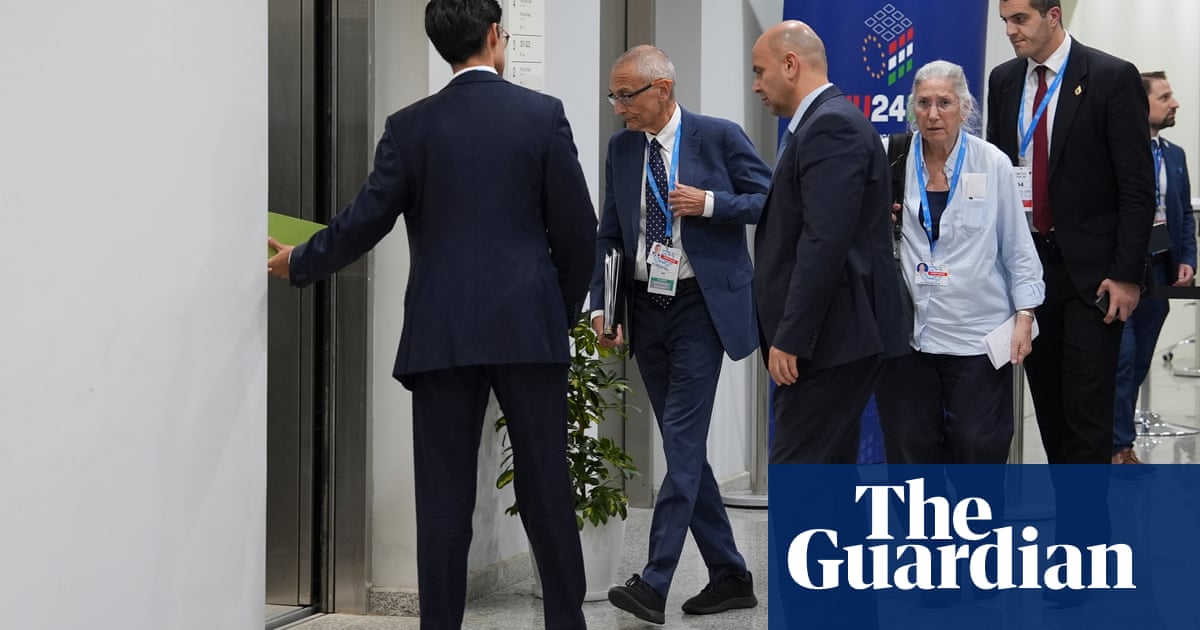Major rich countries at UN climate talks in Azerbaijan have agreed to lift a global financial offer to help developing nations tackle the climate crisis to $300bn a year, as ministers met through the night in a bid to salvage a deal.
The Guardian understands the Azeri hosts brokered a lengthy closed-door meeting with a small group of ministers and delegation heads, including China, the EU, Saudi Arabia, Brazil, the UK, US and Australia, on key areas of dispute on climate finance and the transition away from fossil fuels.
It came as the Cop29 summit in Baku, which had been due to finish at 6pm Friday, dragged into Saturday morning. A plenary session had been planned for 10am but did not eventuate.
The developing world reacted with anger to a draft $250bn climate finance target on Friday, dismissing it as a “joke” and far below the amount that is needed to help the poor shift to a low-carbon economy and adapt to the impacts of extreme weather. It prompted a diplomatic effort behind the scenes to increase the offer from developed nations.
Multiple sources said the EU and several members of the umbrella group of countries including the UK, US and Australia had indicated they could go to $300bn in exchange for other changes to a draft text released on Friday.
The Guardian understands that the UN secretary general, António Guterres, was ringing round capitals to push for a higher figure. Japan, Switzerland and New Zealand were understood to be among the countries resistant to the $300bn figure late on Friday.
A $300bn offer would still fall well short of what developing countries say is necessary, and would likely draw sharp criticism if included in an updated text expected later on Saturday. But with some ministers booked to leave Baku in the hours ahead, countries face a decision on what they are prepared to accept.
Several ministers from rich nations have argued that a deal may be easier now than next year, when Donald Trump will be US president and right-wing governments could be returned at elections in several countries, including Germany and Canada, and they do not want to make a commitment they cannot meet.
Claudio Angelo, from Observatório do Clima in Brazil, said rich countries had “clearly arrived to ditch their obligations”. “After three years of negotiations the first time we ever saw quantum in the text was yesterday,” he said.
He said $300bn in grant funding was “way, way below” what developing countries needed. “Remember, many of them are already in deep debt,” he said. “To have climate finance as the current text proposes will only entrap those countries more.”
According to the draft text of a deal circulated on Friday, developing countries would receive at least $1.3tn a year in climate finance by 2035, which is in line with the demands most submitted in advance of this two-week conference.
But poor nations wanted much more of that headline finance to come directly from rich countries, preferably in the form of grants rather than loans. They said the offer of $250bn coming from rich countries, with few safeguards over how much would come without strings attached, was much too little.
The offer from developed countries is supposed to form the inner core of a “layered” finance settlement, accompanied by a middle layer of new forms of finance such as new taxes on fossil fuels and high-carbon activities, carbon trading and “innovative” forms of finance; and an outermost layer of investment from the private sector, into projects such as solar and windfarms.
These layers would add up to $1.3tn a year, which is the amount that leading economists have calculated is needed in external finance for developing countries to tackle the climate crisis. Many activists have demanded more – figures of $5tn or $7tn a year have been put forward by some groups, based on the historical responsibilities of developed countries for causing the climate crisis.
While climate finance is the major focus at Cop29, other issues also remain unresolved. Azerbaijan, which holds the presidency of the talks, has been criticised for playing down a key commitment to “transition away from fossil fuels” in draft texts.
That commitment was made a year ago at the Cop28 talks in Dubai, but some countries want to unpick it. Saudi Arabia has been widely accused of taking it out of drafts at every opportunity, sparking fury from countries that want to explicitly emphasise the need to move away from coal, oil and gas and towards renewable energy.

